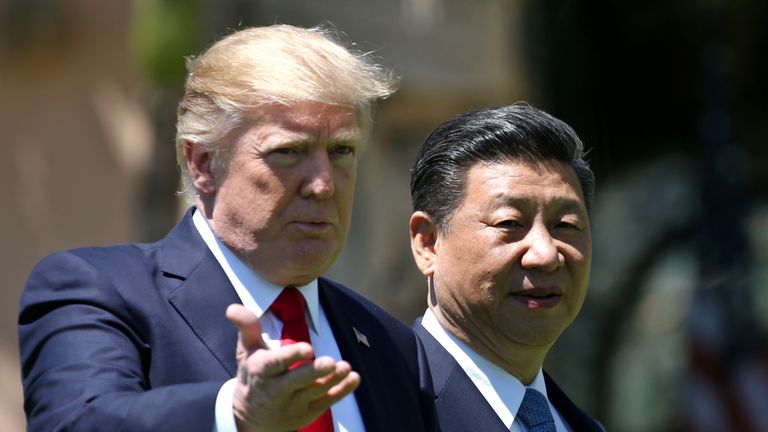Sky Views: Beijing's feud with Sweden over viral clip

Wednesday 26 September 2018 05:42, UK
Tom Cheshire, Asia correspondent
Here's a curious, shaggy dog story, set in Sweden, that reveals a lot about China and how it sees its place in the world.
Earlier this month, a man called Zeng and his parents, both in their 60s, arrived at a hostel in Stockholm after midnight, the night before their reservation.
Check-in didn't open until the next day. Mr Zeng asked if they could sleep in the lobby until then. He claims the hostel refused.
At this point accounts begin to differ. The hostel called Swedish police who "brutally" removed the Zeng family, according to them.
The video shows Mr Zeng's father being carried out of the hostel by police, while Mr Zeng shouts: "This is killing people! This is Sweden police!" in English. His mother wails loudly on the pavement.
Another video apparently shows Mr Zeng arguing with a female police officer, then abruptly hurling himself onto the pavement and starting to weep loudly too. Theatrical doesn't quite cover it. None of the police officers appear to act violently.
Mr Zeng and his parents were then driven by police to a cemetery outside Stockholm and left to fend for themselves, he later told Global Times, a state-run tabloid in China.
He told a different state-run media outlet: "They kept beating my parents and even threatened to abandon us in the woods with wild animals."
And that was that, until two weeks later, when Global Times ran its interview, prompting an extraordinary diplomatic intervention. The Chinese embassy to Sweden described the incident as "brutal abuse", saying it was "deeply appalled and angered by what happened and strongly condemns the behaviour of the Swedish police."
The Chinese ambassador to Sweden has called for an apology, compensation, as well as punishment for the police. For its part, Sweden has found no grounds to investigate its police.
Things only got worse when a satirical Swedish television show ran a segment on the topic on Friday evening.
This Monday, the Chinese foreign ministry called on Sweden to apologise (again) for "a gross insult to, and vicious attack on, China and the Chinese people".
An online army of Chinese nationalist trolls tore into the presenter's Facebook page (some elements of the show did indeed appear racist).
A lot doesn't add up about the original incident. The hostel manager told a Swedish newspaper that he called the police after Mr Zeng made verbal threats to the staff.
The '"cemetery" the family were deposited at is actually an underground station, commonly used as a dropoff point for cases of antisocial behaviour, according to Sweden's top prosecutor.
Also, they're in Sweden! Hardly the home of rough policemen. If you want to see that, Beijing is a much better bet.
Watch the videos and come to your own judgement. I think it's rather embarrassing. Chinese social media users agree: thousands called the Zengs 碰瓷 "pengci", which means "breaking porcelain" and refers to people who fake accidents for compensation.
But the Chinese embassy's intervention was extraordinary, the purest form of China's preferred form of diplomacy: grievance.
The Zeng family refused to take any responsibility for their actions and now they have the full weight of the Chinese state behind them.
The significant background to this too is that Sweden invited the Dalai Lama to visit this month and has also had the cheek to ask the Chinese government to release one of its citizens, Gui Minhai, a bookseller snatched from a train by Chinese authorities in January and detained since then. Sweden-China relations were already at a low.
This is the same for issues much more important than the Zeng family. In the current US trade war, China accuses the US of "bullying" and is unwilling to admit - or even address - any of Washington's legitimate concerns over Beijing's protectionist economic practices.
On Taiwan, it again berates the US for increasing its support of the island, without considering whether Beijing's own increasingly aggressive stance might have prompted this, let alone why the Taiwanese people chose to elect a pro-independence president.
The rhetoric of victimisation has a long - and justified - history here.
China was made to suffer from the unequal treaties forced on it by the Western colonial powers in "the century of humiliation" that began with the Opium War.
That grievance became an important part of China's narrative following the end of the Qing dynasty in the early 20th century, both for the nationalists and the Chinese Communist Party.
A great deal of the CCP's legitimacy still rests on being the group to finally right that old wrong and restore China's international standing.
But as China has risen, grievance has reached its limits. Victimhood isn't a convincing look for a military power with expansionist tendencies and the world's second-biggest economy. The whole incident in Stockholm lays out those limits starkly. And it demeans both China and its citizens.
One social media user wrote, according to the New York Times: "I condemn this kind of unruly behaviour."
Another wrote: "It is shameful for the whole family and the whole country."
That sentiment is good advice for the Chinese embassy in Sweden. No sovereign state likes to admit its mistakes, certainly not publicly. But there's a difference between that and throwing its toys out the pram onto the world stage.
Sky Views is a series of comment pieces by Paste BN editors and correspondents, published every morning.
Previously on Sky Views: Paul Kelso - Contaminated blood is hidden, silent slaughter


